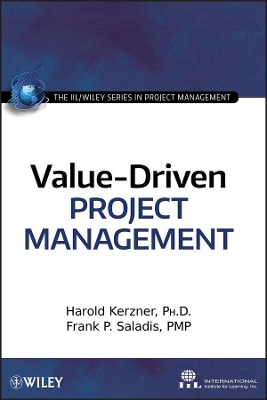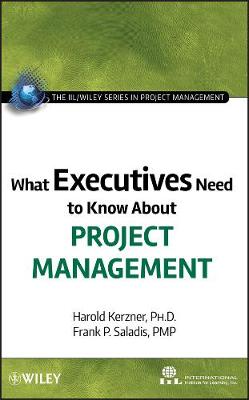IIL/Wiley Series in Project Management
4 primary works
Book 1
Value-Driven Project Management
by Harold Kerzner, Frank P. Saladis, and International Institute for Learning
In the traditional view of project management, if a project manager completed a project and had adhered to the triple constraints of time, cost, and performance, the project was considered a success. Today, in the eyes of the customer and the parent or sponsoring company, if a completed project did not deliver its anticipated value, it would be seen as a failure.
Today's changing economic climate, marked by an increasingly competitive global environment, is driving project managers to become more business oriented. Projects must now be viewed from a strategic perspective within the context of a business or enterprise that needs to provide value to both the customer and the organization itself. As a result, project managers are now required to possess the skills to complete a project within certain specifications, and also know how to create and deliver value.
Responding to the needs of today's project managers, Value-Driven Project Management begins by changing the paradigm of project management. Rather than judge the success of a project from the perspectives of time, budget, and quality, the authors demonstrate why success is only achieved when planned business values are met, including:
- Internal value
- Financial value
- Future value
- Customer-related value
The authors also offer best practices that allow you and your organization to create additional value in efficiency, customer satisfaction, and enhanced products and services. Finally, the book helps you incorporate value into clearly defined business objectives and "sell" the value-driven process to executives.
Throughout the book, helpful illustrations clarify complex concepts and processes.
Assigning valuable resources to projects that don't provide some tangible form of value to the organization and to the client is poor management and poor decision-making. On the other hand, selecting and implementing projects that will deliver value and an acceptable return on investment is effective management and decision-making, but is very challenging, especially when a project may not provide its target value for years to come. With Value-Driven Project Management in hand, you'll discover the tools you need to ensure that projects deliver true value upon their completion.
Book 2
What Executives Need to Know About Project Management
by International Institute for Learning, Harold Kerzner, and Frank P. Saladis
As project management has evolved and matured, so has the executive's role in project management. To ensure the success of individual projects and the organization as a whole, today's executives are increasingly involved in activities such as capacity planning, portfolio management, prioritization, and strategic planning specifically for project management. In fact, more and more executives are becoming certified Project Management Professionals (PMPs).
What Executives Need to Know About Project Management offers executives a guide to project management, focusing on what they need to know and what they need to do. It provides step-by-step guidance to help executives get effective, well-resourced project management teams in place and ensure the success of any individual project.
The book begins with basic principles, including a detailed discussion of the three best practices that enable executives to ensure effective project management:
- Developing an environment where project management is viewed as a profession
- Securing key personnel for project management positions
- Creating opportunities for rewards and advancement through successful project management
Next, the book explores how executives serve as executive sponsors in project management teams, setting forth solutions to the many problems and challenges they face in this role, including managing disagreements, delegating authority, and accelerating projects.
The authors explain how the role of the executive sponsor changes depending upon the life-cycle phase of the project. For example, during the project initiation and planning phases, the sponsor may take on a very active role, ensuring that proper objectives are established and that the project plan satisfies the needs of the business as well as the needs of the client. During the execution phase, the sponsor may take on a less active role; however, the book shows how executive sponsors need to become involved when roadblocks appear, crises occur, and conflicts arise over priorities among projects.
Throughout the book, helpful illustrations clarify complex concepts and processes.
Book 3
What Functional Managers Need to Know about Project Management
by Harold Kerzner and Frank P. Saladis
Book 13


